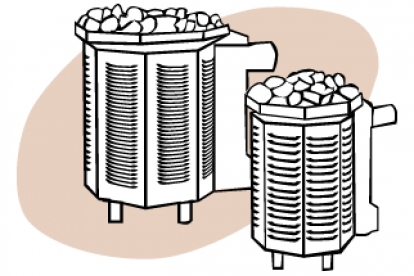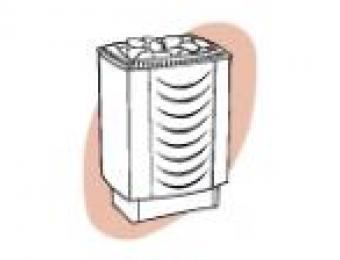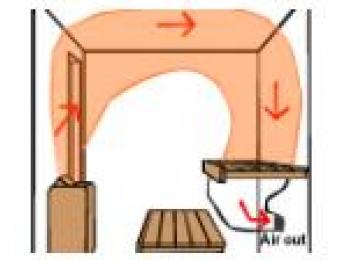- As of July 2013, we're unaware of any gas sauna heaters available for sale in Australia anymore. It's also illegal for a gasfitter to install any gas appliance that doesn't carry an Australian Gas Association Approval - so we'd very strongly advise against importing a product that doesn't carry this approval. If you do know of an approved gas sauna heater for sale in Australia, please drop us a line!The BUILD team.
Gas saunas, simply because they use gas, are significantly cheaper to operate than electric models. Likewise, gas is considered to be a 'cleaner' technology, in that it results in much less in the way of CO2 emissions than electricity does. Not all homes have access to gas, but if you're planning on installing a large sauna or if you intend to use it regularly, a gas heater is likely to be a much more cost effective option in the long term. Gas sauna heaters can work either on natural gas, on LPG, or in some cases on propane. LPG and propane heaters are generally smaller, and are supplied by an external gas bottle.

How do gas sauna heaters work?
Gas sauna heaters are not as common as electric models, but the basic function and operation is the same. A gas burner, fed either by built-in gas piping or an LPG or propane gas tank, is used to heat a metal plate on which heat absorbing stones are stacked. As the stones heat up, they warm the surrounding air, which then moves around to heat the room via convection.
When the stones are hot, water is gently added to them which instantly evaporates to create steam. This steam is then circulated throughout the sauna to create a hot, humid enviroment.
How powerful should my gas sauna heater be?
The most important consideration for a gas heater is much the same as the one for the electric model; the heater needs to be of sufficient size and power to effectively heat the space, but not so big that it will heat the air directly and leave the stones and benches cold. The heating capacity of gas sauna heaters is measured in British Thermal Units (BTUs). Most manufacturers will provide an indication of the area that each of their models is capable of heating.
- In most cases, you will need a gas sauna heater heater capable of about 2500 BTUs per cubic metre (m3) of space in your sauna. If you're building your sauna outdoors - particularly in a cold climate - you may wish to add another couple of thousand BTUs to compensate for the additional heat loss.
What type of gas should I use?
Natural gas is the cheapest and cleanest option, but unfortunately it isn't available to every home in Australia. While it's widely available in Melbourne, it's not always so readily accessible in Sydney, or even in rural areas in Victoria. If you plan on using natural gas, you will need to ensure you have access to gas piping (also called 'gas reticulation') in your area. If this isn't available, you may wish to use LPG tanks or even propane as a substitute. Keep in mind that these are slightly more expensive, though.
Safety considerations
Gas creates exhaust fumes when burned. Because of this, your gas heater will need to a flue to vent these exhaust fumes outside. For the same reason, it'll also need its own external air intake, independent of the sauna's main ventilation system. Likewise, because gas is volatile you will need an accredited gas fitter to install the piping and connect the heater to the gas supply too.
Control of the temperature is handled through a thermostat similar to the electric model. Gas responds faster to temperature adjustments than electricity, but the difference isn't normally noticeable, given how the heat is transferred.
Quality and materials
As with other types of sauna heaters, if the unit you’re thinking of buying is painted, be aware that the paint can become separated from the body of the heater after time, resulting in bare patches which are vulnerable to corrosion. The best heaters will have a stainless steel body which is far more durable.
|
Advantages
|
Disadvantages
|





